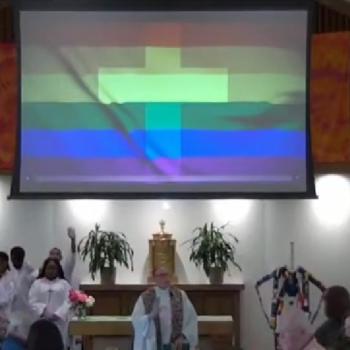A recent article by a fellow Patheos writer, and a comment he received from a reader, got me thinking about the relationship between truth and tribalism. In the article, the author juxtaposes knowing “right facts” and “love.” The author states:
Charity, not knowledge, saves; if we over-emphasize knowledge, we end up creating ideologies which serve as the basis of conflict instead of promoting the love God wants out of us. Confusing faith with ideology not only promotes tribalism, it suggests that we can end up comprehending the truth, for ideologies rely upon their apparent comprehensibility as a means of promoting themselves. [Emphasis added]
In response, a reader stated:
…theological facts do matter, if nothing else but to be able to discern the spirits and to worship God and love neighbor in spirit and truth. Instead of self-delusion.
It appears the author of the linked piece attempts to pit knowledge against charity, or truth against love. Truth (or an over-emphasis of it) divides, while love always unites.
Does this sort of thinking create a false dichotomy? Where does truth fit in with love? Furthermore, when discussing things like truth, whether relative truth, personal truth, or objective truth, lines become drawn and people tend to fall into groups (or tribes). Therefore, the goal ought not to be the avoidance of the inevitable tribalism but to align ourselves with the Truth (Christ) which will likewise align us with Love (for God is love).
The Truth About Truth
To quote Pontius Pilate in John 18:38, “What is truth?” Regardless of our own beliefs regarding truth, whether we believe in objective truth, relativism, or our own “personal” truth, we tend to fall into groups (or tribes). The secularists place themselves in the tribe that best reflects their view of truth, as do those who identify as LGBTQ. Furthermore, some within the LGBTQ tribe even demand others affirm their own “truth” or suffer social consequences. For the most part, Christians who tend to believe in objective truth fall into the objective truth tribe, along with some secularist and other theists. It appears none of us escape some form of tribalism or another.
What’s Love Got to do With It?
Moreover, in the previously mentioned piece, the author ties love to service. He states:
No matter how much theological study we have done, no matter how great an insight we might have to the mysteries of the faith, if we have not cultivated love, not just for ourselves, but for others, we have not properly understood the truth of the faith; we might be able to say many things about God, but we will show we do not know God because God is love. Those who know love and act upon it in their lives know God, even if they do not know God in a theological or religious manner. And because they know God in and through that love, God knows them. This is exactly the point Jesus was making when talking about the last judgment.
Aside from this almost appearing Pelagian, this sort of thinking unnecessarily pits knowledge of God against love of God and neighbor. The Church teaches that God knows all hearts and that God judges justly. If a person, at no fault of their own, does not know God or know of God as revealed by His Church, God judges this person by the amount of knowledge they do possess and how they lived their life. All receive salvation through Christ, not merely their works—even works performed in love. Some receive this salvation knowingly and others unknowingly.
I Never Knew You…
For proof of the author’s argument, the author cites Matthew 25:31-46 (the parable of the sheep and goats). In this parable, Jesus tells his followers about the sheep who fed the hungry, gave drink for the thirsty, welcomed the stranger, clothed the naked, and visited the sick and imprisoned. The sheep unknowingly did all these things to Jesus. Conversely, the goats failed to do these same things to Jesus. The sheep entered the kingdom of heaven and the goats into the fires of hell.
The words Jesus uses here regarding judgement reflect an early passage in Matthew (Matthew 7:21-23). Jesus states:
“Not everyone who says to me, ‘Lord, Lord,’ will enter the kingdom of heaven, but the one who does the will of my Father who is in heaven. On that day many will say to me, ‘Lord, Lord, did we not prophesy in your name, and cast out demons in your name, and do many mighty works in your name?’ And then will I declare to them, ‘I never knew you; depart from me, you workers of lawlessness.’
Here, the one “who does the will of my Father” enters heaven and those who work “lawlessness” depart to hell. They preformed “mighty works” but did not truly know Jesus, therefore Jesus did not know them either.
I Am the Way, and the Truth, and the Life
Circling back to truth… Jesus, in John 14:6 personally identifies with truth. He declares:
I am the way, and the truth, and the life. No one comes to the Father except through me.
And later:
If you love me, you will keep my commandments. And I will ask the Father, and he will give you another Helper, to be with you forever, even the Spirit of truth, whom the world cannot receive, because it neither sees him nor knows him. You know him, for he dwells with you and will be in you. I will not leave you as orphans; I will come to you. Yet a little while and the world will see me no more, but you will see me. Because I live, you also will live. In that day you will know that I am in my Father, and you in me, and I in you. Whoever has my commandments and keeps them, he it is who loves me. And he who loves me will be loved by my Father, and I will love him and manifest myself to him.
Here, Jesus (the Truth) states that those who love Him keep His commandments. Furthermore, Jesus promises to send the Holy Spirit (Spirit of Truth) as a Helper. Conversely, the world neither knows nor sees the Holy Spirit. The world contains its own spirit in opposition to the Holy Spirit.
In these passages, Jesus ties the concepts of truth and love together within Himself. In so doing, Jesus dispels the false dichotomy some (including the author) creates between truth and love.
Moreover, let’s not forget:
Beloved, let us love one another, for love is from God, and whoever loves has been born of God and knows God. Anyone who does not love does not know God, because God is love. (1 John 4:7-8)
The Tribal Truth
As the reader rightly observed:
…theological facts do matter, if nothing else but to be able to discern the spirits and to worship God and love neighbor in spirit and truth. Instead of self-delusion.
Furthermore, downplaying the role of truth in opposition to love presents yet another opportunity for the tribalism the author seeks to avoid. As previously stated, tribalism of one form or another seems inevitable. Therefore, our goal ought to be to align ourselves with the Truth (Christ) which likewise aligns us with Love (for God is love). To do so, we must know the truth about the Truth. We must “discern the spirits” to determine the “Spirit of truth.”
This requires knowledge. We must avoid these “either…or” situations and understand the truth reflected in the “both…and” of Jesus, the Godman, the God and man—Truth and Love.
Thank you!
Read The Latin Right’s other writing here.














